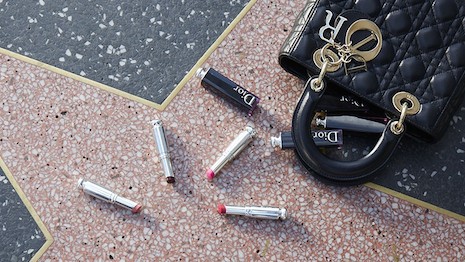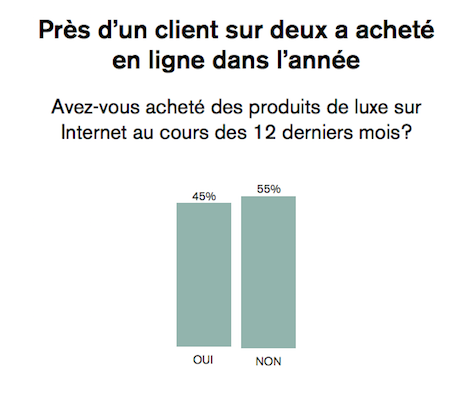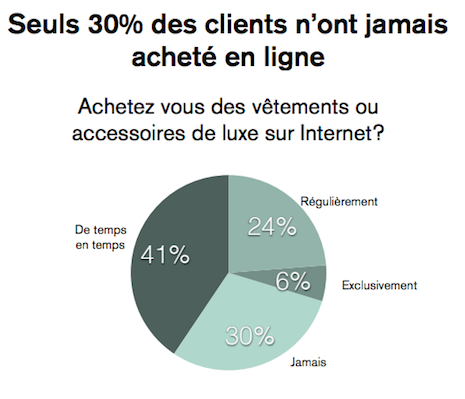 Half of French luxury shoppers have purchased online in the last year
Half of French luxury shoppers have purchased online in the last year
Online shopping is steadily growing as a form of luxury commerce, with nearly half of French luxury consumers admitting to purchasing at least one luxury item online in the past year.
This data comes from a new report from the Institut Français de la Mode in partnership with retailer Matches Fashion. The report, the IFM Index, looks at French luxury shopping habits to come up with a look at how the landscape looks currently and what French consumers want from luxury brands.
Digital appetites
While luxury brands put a lot of effort into the physical component of shopping at a store, including the precise decoration and layout of their boutiques, online shopping is increasingly becoming a major part of the luxury shopper’s experience.
The IFM surveyed a large number of French luxury consumers to gauge exactly how much online shopping they do and what proportion of their shopping is done online.
What they found was that 45 percent of French shoppers had purchased a luxury good online in the last year. If stretched beyond one year, this number climbs even higher, to 70 percent.
 Forty-five percent of French shoppers have bought something online in the past year
The report also found that nearly one in three shoppers regularly buys luxury goods online or exclusively online. The total population is generally divided into thirds, with one third buying online regularly or exclusively, one third buying online occasionally and one third never buying luxury goods online.
This data held up even when split by gender. French women shop online only slightly higher than men at 46 percent to 44 percent, respectively.
Age plays an important if unsurprising role, with younger consumers and millennials being more likely to purchase online than older counterparts.
Additionally, nearly 60 percent of customers browse luxury goods online before going into the store to purchase an item.
Finally, customers are ready to try new technologies. Eighty percent of customers said they would be willing to try virtual or augmented reality in the shopping process.
International ecommerce
The appetite for luxury ecommerce will be important to the luxury industry as desire for cross-border commerce grows.
Cross-border ecommerce opens up brands to shoppers in countries that are growing more rapidly than established, saturated markets such as the United States and Europe, but retailers should do their due diligence before making a move. To make headway with global consumers, localization efforts should deliver both market-specific content and commerce features (see story).
Forty-five percent of French shoppers have bought something online in the past year
The report also found that nearly one in three shoppers regularly buys luxury goods online or exclusively online. The total population is generally divided into thirds, with one third buying online regularly or exclusively, one third buying online occasionally and one third never buying luxury goods online.
This data held up even when split by gender. French women shop online only slightly higher than men at 46 percent to 44 percent, respectively.
Age plays an important if unsurprising role, with younger consumers and millennials being more likely to purchase online than older counterparts.
Additionally, nearly 60 percent of customers browse luxury goods online before going into the store to purchase an item.
Finally, customers are ready to try new technologies. Eighty percent of customers said they would be willing to try virtual or augmented reality in the shopping process.
International ecommerce
The appetite for luxury ecommerce will be important to the luxury industry as desire for cross-border commerce grows.
Cross-border ecommerce opens up brands to shoppers in countries that are growing more rapidly than established, saturated markets such as the United States and Europe, but retailers should do their due diligence before making a move. To make headway with global consumers, localization efforts should deliver both market-specific content and commerce features (see story).
 French shoppers were divided roughly equally between never, sometimes and often shopping online
Luxury brands will have to streamline their ecommerce to deal with this growing desire in a way that appeals to both domestic and international shoppers.
As more brands offer options for international shipping and local currency purchasing, luxury consumers are beginning to expect a certain level of convenience to cross-border ecommerce. The luxury brands that encourage this expectation and rise to meet it will be most successful (see story).
Luxury brands should be aware of customers’ expectations when it comes to ecommerce. As the digital world increasingly consumes different aspects of the retail industry, measuring where consumers are will be important to meeting them halfway.
French shoppers were divided roughly equally between never, sometimes and often shopping online
Luxury brands will have to streamline their ecommerce to deal with this growing desire in a way that appeals to both domestic and international shoppers.
As more brands offer options for international shipping and local currency purchasing, luxury consumers are beginning to expect a certain level of convenience to cross-border ecommerce. The luxury brands that encourage this expectation and rise to meet it will be most successful (see story).
Luxury brands should be aware of customers’ expectations when it comes to ecommerce. As the digital world increasingly consumes different aspects of the retail industry, measuring where consumers are will be important to meeting them halfway.
